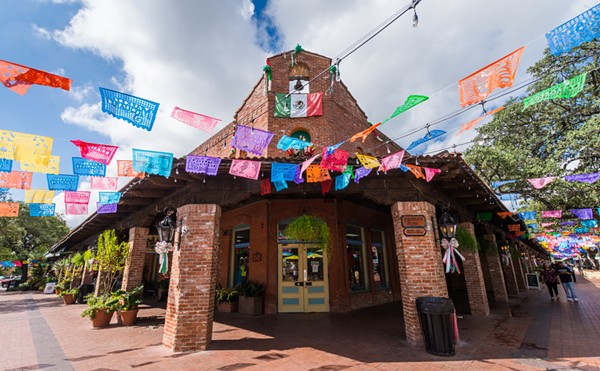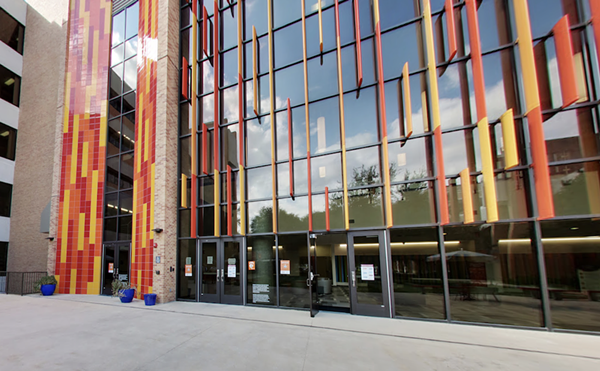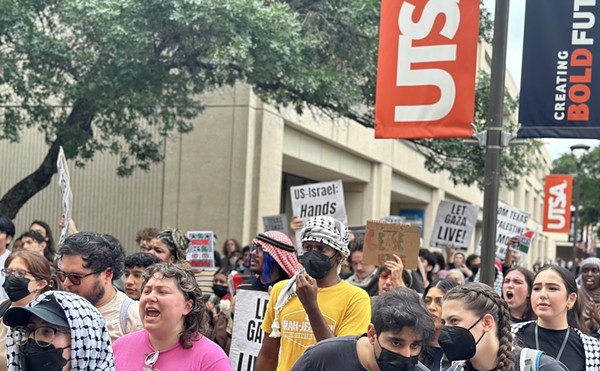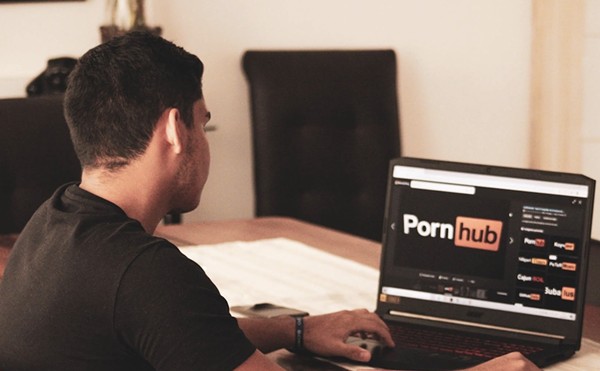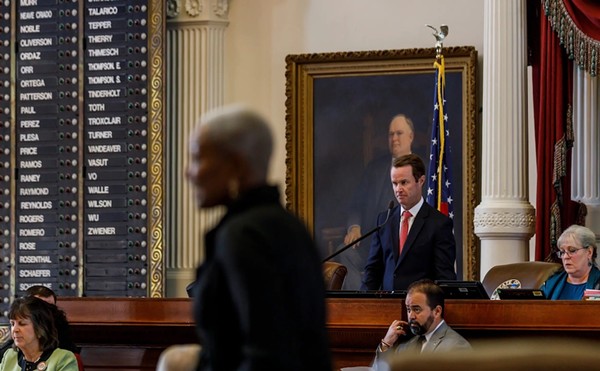By Enrique Lopetegui
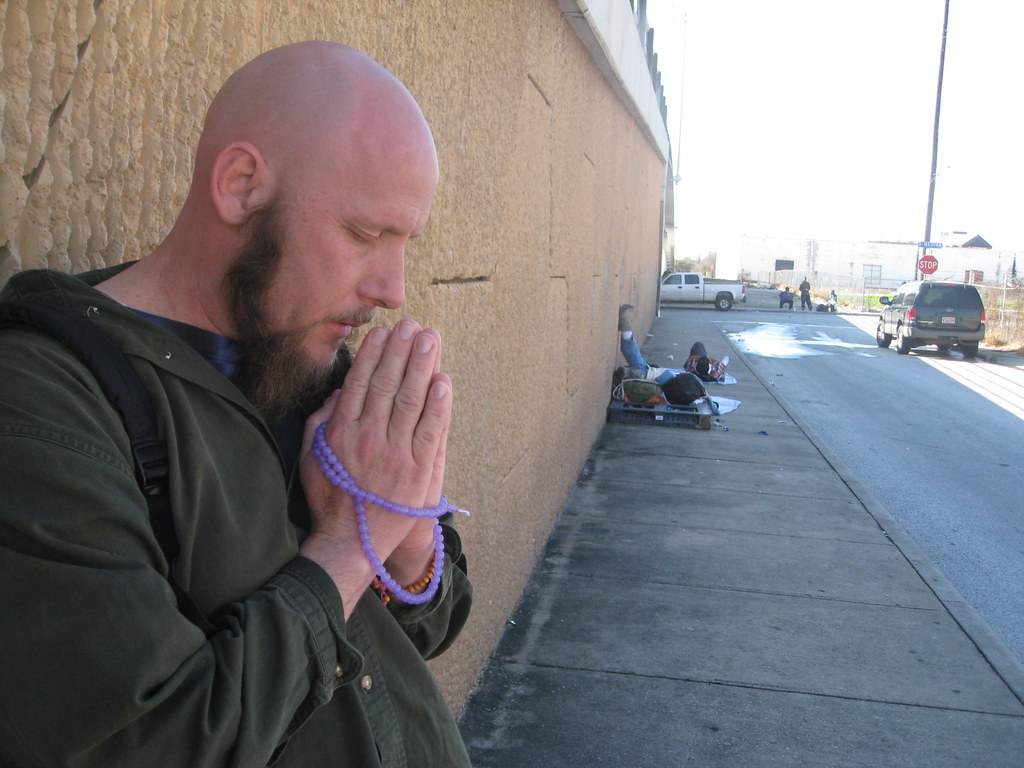
“Don't worry, man,” Kiley Jon Clark, a.k.a. Sonom Gyatso, tells me as we approach the West Commerce bridge. “When you come here, `the homeless` treat you with both respect and distrust. They don't know if you're a cop, or immigration, or a weirdo. Like any community, there's violence in their peer group, because there are different ranks. But very rarely there's any violence outside their peer group.”
Clark is the head of the Homeless Meditation Practitioners Street Dharma project, an independent ministry blessed by his guru, Lama Tulku Karma Rinpoche, founder of the Yogi Tsoru Dechen Rinpoche Foundation. Since January, Clark has come to the bridge twice a week to meditate on the sidewalk, sitting a few feet away from the entrance to the SAMMinistries Shelter, where he used to work part-time last fall.
As we walk by, several people greet him in a friendly manner.
“What's up, man?” Clark asks one of them. “I haven't seen you in a while. Ready for some meditation?”
“Yeah â?¦ I'll stop by in a little bit.”
He does, as do dozens who, at different times, approach Clark after he spreads out a Tibetan cloth on the sidewalk at the dirtiest, most populated spot. He places a little Buddha, incense, books, and sets of big and small 108 mala beads strung together. As the smell of incense fills the block, he hits on a Tibetan chime, and begins his prayers.
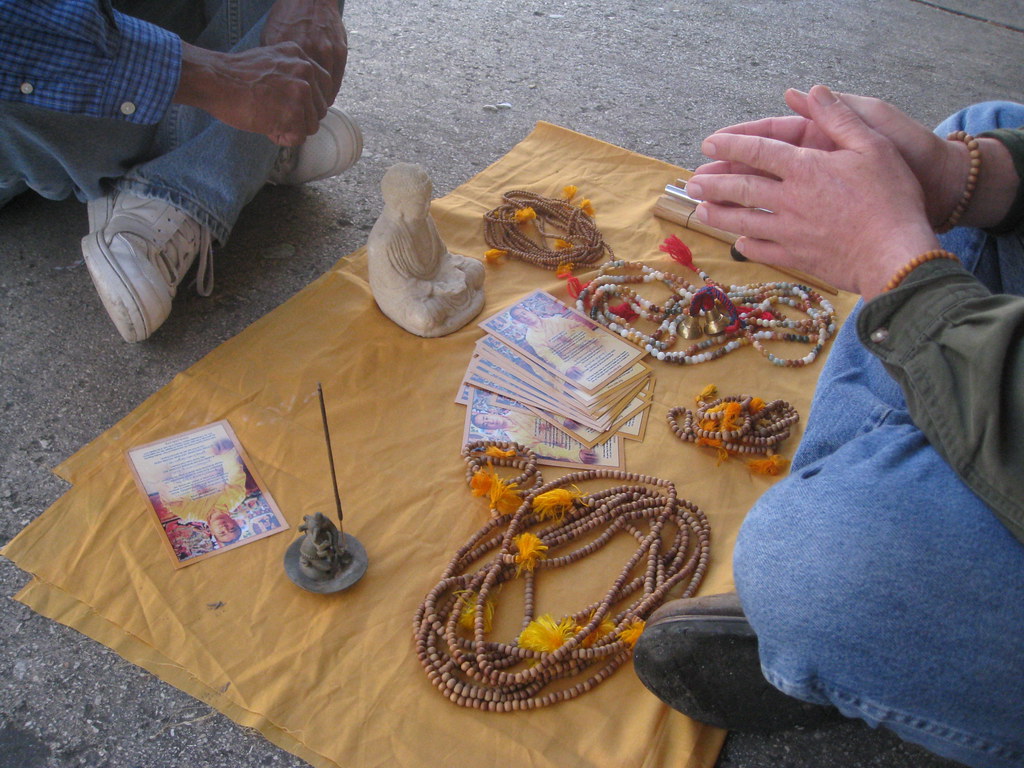
“OM MANI PADME HUM â?¦ OM MANI PADME HUM,” he chants. Depending whom you ask, the popular Tibetan mantra means different things. The Dalai Lama once said that it means that it helps you “transform your impure body, speech, and mind into the pure exalted body, speech, and mind of a Buddha.”
“I'm not trying to convert anybody to Buddhism or anything like that,” Clark says. “I come down here and do my own meditation and prayers for all sentient beings. What I find is that people come to me and ask me about Buddhism, and some of them want to learn different meditation techniques just to improve the quality of their own thought life. If they're Christian, I tell them the truth: That I have a deep respect for Jesus. If they're not into Buddhism, that's fine. I tell them to stay a Christian, or a Muslim, or whatever they are or aren't. And I very rarely get treated mean or aggressive.”
Clark and the homeless hit it off pretty well. He speaks in a soft, unintimidating voice, and whatever he does â?? the prayers, the incense and especially the regular utterance of “FREE beads” â?? act like a magnet. Some sit by his side and observe. Others try to join in the chanting. One man tells Clark about his years of self-medicating, and Clark can relate to that.

“I know what you're talking about, brother,” Clark says. “I was self-medicating too, with alcohol, and you self-medicate when you're sick, don't you? So why was I sick? The more I started meditating, the more I realized that it was my own thoughts that were driving me crazy. The only thing that would quiet my mind was alcohol or a joint.”
“Yeah, man â?¦ I can't sleep now,” says the man. “When I quit drinking I didn't sleep like for four days, I had insomnia. I'd hear shit outside and I'd freak out.”
“Yeah, I went through that,” says Clark. Several observers talk in unison, seeing themselves in the story. The man gets up, thanks Clark for the beads, and leaves.
A woman carrying a stuffed toy elephant shows up.
“What are you carrying there?” Clark asks.
“He says he wants a necklace,” says the woman.
“I'm going to give you one of the small ones,” says Clark, who holds the beads between his hands and begins blessing them.
“Here you go, buddy,” he says, placing the beads around the elephant's neck. “This will bring you good luck. Now you're a Buddhist elephant.”
“Are you a Christian?” Clark asks a curious woman.
“All religions,” she says.
“This is like a rosary, you pray on it,” Clark says. “Whatever religion you are, you pray. We pray for the end of everyone's suffering.”
She takes the beads, thanks him, and leaves.
A younger man, who appeared to be dealing at the curb, stops by to check things out.
“Would you like some beads?” Clark asks.
“No, man â?¦ I don't believe in that stuff,” says the man.
“I'm just praying to find happiness and the end of suffering for everyone,” Clark explains. “Whether it helps the world or not, it helps me immensely. Does that make sense?”
“It makes sense, my brother,” the man says, finally accepting the beads. “Thank you very much.”
Some walk by Clark, either ignoring him, saying “Hell no!” or politely refusing to stop. But the vast majority of the homeless show respect and act as if they know Clark is not there to screw them.
“His presence here is very important,” says a man wearing a SAMMinistries badge with “John” written on it. “I believe all religions are the same. They might express it differently, but basically they mean the same. And peace is what we all need. Some people do it with a handshake, some do it with a smile. It's very important that we care for each other.”
And Clark cares about the homeless, but it wasn't always that way. For years, all he cared about was alcohol.
“In my previous life,” he says, “I grew up in an alcoholic home and I myself was breaking the law and went to jail for several alcohol-related offenses. You know, public intoxication, DWI, stuff like that. ”
Clark got married in 1994, and had three daughters. After separating from his wife in 2005, while going through the divorce he came across a book on Zen Buddhism at a used bookstore. He began studying it and was so hooked that he wrote the previous owner thanking him for the book.
“Within three days he wrote me back and invited me to the `Shambala Meditation Center` on St. Mary's,” Clark says. “I would show up and he wouldn't be there, or he would show up and I wouldn't be there.”
One day, a girl at the center asked him to come to the airport with her “to pick up a teacher.”
“We're standing there at the airport, talking, and all of a sudden this Tibetan monk comes in all his robes and mala beads,” Clark remembers, as we leave the West Commerce bridge. “It was Lama Tulku `Karma Rinpoche`, the man in the books. I was like, â??Oh, my Godâ?¦!' He was like the incarnation of peace and serenity.”
Lama Tulku, born in Nepal in 1974, belongs to the Nyingma school of Buddhism, founded in the eighth century by the Indian tantric master Padmasambhava, and is the oldest of the four main lines of Buddhism. As a child, he was recognized by the order as the incarnation of Yogi Tsoru Dechen Rinpoche of Chamdho, Tibet, and he now runs an orphanage in India, while leading the YTDR Foundation and dharma centers in seven cities around the world.
After receiving instruction from Lama Tulku for a year, Clark took formal initiation â?? “refuge vows,” meaning that the Lama formally accepted him as a disciple â?? in January 2007, and received his spiritual name, Sonom Gyatso, which means “Ocean of Merit.”
After giving up alcohol and working as a welder, Clark started driving a donation truck for SAMMinistries five days a week, and on Saturdays he would volunteer his own time leading a meditation group in the shelter. And then came the chair incident.
Clark refuses to say anything bad about his former employers (“Going to work for SAMMinistries was the best thing that could have happened to me,” he says), but he wrote about the incident in his blog.
On December 26, 2009, while teaching a group at the shelter, “the guy I was talking to was `bad mouthing` the staff and the shelter.”
So after five minutes of meditation, Clark “rose straight up, turned around, and threw my chair across the room.” The group froze.
"If they would give us comfortable chairs around here, then maybe we could meditate better!” Clark shouted. “If they would feed us decent food maybe we would feel better! If everybody in this room would shut up once in a while, maybe we could concentrate!"
Clark says that, after the initial shock, the group got the message and started laughing.
"See, isn't that how our minds work?” he recalled telling them. “How easily our emotions drag us around? We are so busy trying to fix or blame the outside world for our problems ... and never get down to the real issue â?¦ which is fixing ourselves."
Apparently, someone at the shelter didn't find the incident funny nor educational, and days later Clark was let go. (At the shelter's office, after asking me “What's your bed number?” a woman named Norissa told me she had no comment and gave me the number for the main office. At press time, SAMMinistries CEO Navarra Williams hadn't returned our call.)
So last January Clark took his dharma to the streets. Commerce Street, to be exact, a few feet from his former employer's door, and every Thursday at the Floresville apartment he shares with Diane Superits Meier, his second wife, his two older daughters, and her two younger sons. He and Diane have been together since January 2008.
“When you're 22, you don't know what love really is,” Clark says. “I do now, and I have found it with her.”
The apartment's walls are decorated with Buddhist scrolls passed on to Clark by Lama Tulku, and the center of the living room is an altar that, he hopes, will attract like-minded souls in order to develop a full-fledged dharma center. The temporary home center is already officially listed in the YTDR website (the other Texas center is in Lubbock).
“I know, Floresville isn't the best place in the world for a Buddhist,” he says. “But my teacher has empowered me to open a meditation center and to do this with the homeless. I just have to have faith and, if my motivation is pure, one way or the other the money will find me to keep this ministry going.”
For the time being, Clark's also running an online spiritual bookstore, where he sells donated books about different religions.
“Buddhist, Christian, Hindu â?¦ Anything spiritual,” he says. “If it's spiritual and it's going to improve the quality of your life, I'll sell it. I'm trying to share spiritual knowledge with people, regardless of what religion it is. As long as it's good and beneficial, I will share it.”
Kiley Jon Clark is not a monk, and he doesn't pretend to be one. When he and Diane chant the Tibetan prayers together they have trouble properly pronouncing the words, and then decide to say them in English. But Buddhism and all bona-fide Eastern spirituality, unlike Western philosophy, is not about knowledge but transformation. That very unpretentiousness and humanity in Clark, unlike the so-called utmost purity of countless religious leaders who eventually fall down bringing the spiritual life of their followers with them is, perhaps, what makes him click with the homeless. And it is what might help him realize his other dream: To bring other Buddhist groups together and spread the HMP gospel, as he has done individually in San Antonio.
“You got Tibetan, Zen, and other kind of Buddhist groups all over town, but they never talk to each other,” he says. “What I'm trying to do is put them together and say, hey, let's invite all the Buddhist groups together, and I'll come in and do a teaching on loving kindness and compassion. I'll take them to the streets a few times, and show them how easy it is. It's intimidating at first, but after a few times you'll feel so good. The love bounces back on you.”
On March 16, Clark started working as a custodial trainer for Haven for Hope. He will be training groups of 10 ex-homeless people in custodial arts so that they can find employment in that field.
“To work here is the greatest opportunity of my life,” he wrote in an email. “I will clean a trillion toilets just to have the chance to smile at one person with true compassion.”
Like he did under the bridge. I remember a Hispanic man carrying some suitcases in a rolling cart, who approached him speaking in broken English. He had been observing Clark for a while, and then he shyly approached him.
“My main problem is about the love, you know?” the man said. “When you love a girl, many troubles in family ... I don't know why that happens. Can you pray for that?”
“Of course I can,” Clark told him. “Give me your hand.”

The man thanked Clark, took his luggage, and went to the corner. Standing by a light pole, he looked a the sun. He closed his eyes, and just stood there for several minutes, smiling.
For more information, visit HMPStreetDharma.org and ytdr.org.






